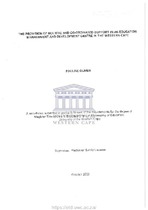| dc.contributor.advisor | Lazarus, Sandy | |
| dc.contributor.author | Oliver, Pauline | |
| dc.date.accessioned | 2021-10-08T07:36:11Z | |
| dc.date.available | 2021-10-08T07:36:11Z | |
| dc.date.issued | 2003 | |
| dc.identifier.uri | http://hdl.handle.net/11394/8499 | |
| dc.description | Magister Educationis - MEd | en_US |
| dc.description.abstract | The central aim of this study was to examine the Western Cape Education Department's restructuring process, which entails changing the centralised support service to a more decentralized one through the newly constituted Education Management and Development Centres (EMDCs), in particular, the aim of the study was to explore how one Multi-Functional Team (MFT) in an EMDC structure is attempting to provide more holistic and co-ordinated support to schools. Chapter 1 briefly discusses the South African context, providing a brief historical overview and description of education relevant policy challenges. This chapter also outlines and provides details of the decentralisation process, the challenges of developing an holistic and co-ordinated approach to support, and the research aims, questions and research
methodology. In Chapter 2 a literature inter-sectoral collaboration in relation challenges of inter-sectoral to explore the concept of inter This
includes an overview of the Chapter 3 provides an overview of the researcn approach,· research design, data collection methods, data processing methods and an ethics methods Chapter 4 provides an analysis and interpretation of data obtained under the categories of
analysis provided by the research questions. Chapter 5 provides a summary of the findings as well as recommendations for the improvement of inter-sectoral collaboration within the EMDCs. It also includes a reflection on the research process. The study showed that there is a growing realisation in the EMDCs that services cannot be carried out in isolation and that collaboration, co-operation and co-ordination are
necessary for more effective and holistic service delivery. Most of the participants in this study emphasized that services need to be better coordinated and that there was a need for better communication and leadership within the MFT. When asking the question about the difficulties experienced in trying to co-ordinate support services, they said that there is little co-ordination and management within the MFT. Some of the participants said that there is no time for reporting, recording or planning, and most of the time all the role players are not available to attend meetings or discussions. The primary reason given for poor co-ordination was that there was a lack of overall co-ordination in planning projects being run in the EMDC . This study should make a contribution to an understanding of how the EMDC can provide more coordinated and holistic support to schools. It should, among other things, give insight into the challenges of inter-sectoral collaboration and how to address these challenges. | en_US |
| dc.language.iso | en | en_US |
| dc.publisher | University of the Western Cape | en_US |
| dc.subject | Western Cape Education Department (WCED) | en_US |
| dc.subject | Education Management and Development Centers (EMDC) | en_US |
| dc.subject | Multi-Functional Team (MFT) | en_US |
| dc.subject | Data collection | en_US |
| dc.subject | Curriculum Advisory Service (CAS) | en_US |
| dc.subject | Management and governance support | en_US |
| dc.title | The provision of holistic and .co-ordinated support in an education management and development centre in the Western Cape | en_US |
| dc.rights.holder | University of the Western Cape | en_US |

